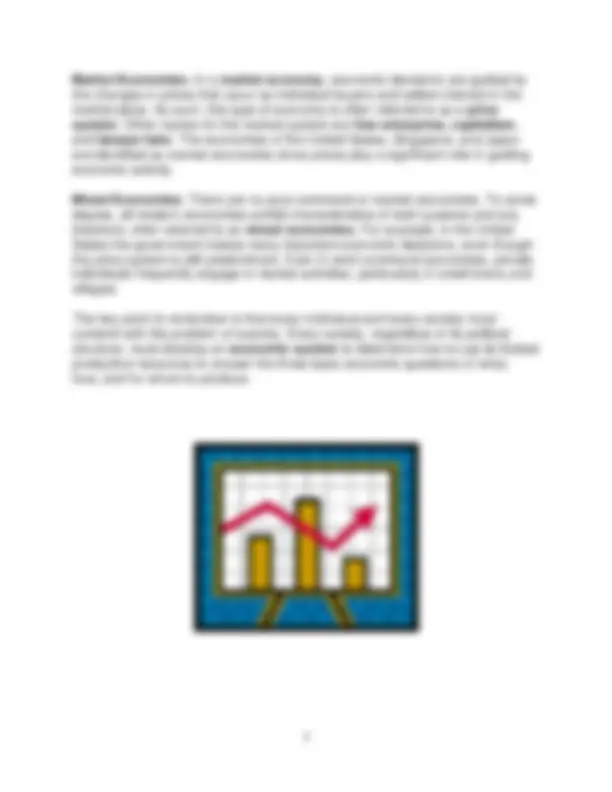



Study with the several resources on Docsity

Earn points by helping other students or get them with a premium plan


Prepare for your exams
Study with the several resources on Docsity

Earn points to download
Earn points by helping other students or get them with a premium plan
Community
Ask the community for help and clear up your study doubts
Discover the best universities in your country according to Docsity users
Free resources
Download our free guides on studying techniques, anxiety management strategies, and thesis advice from Docsity tutors
The concept of scarcity and the resulting economic problem faced by societies. It outlines the three fundamental questions every society must answer to make the best use of limited resources: what to produce, how to produce, and who to produce for. The document also explores various economic goals and values, as well as different economic systems, including traditional, command, market, and mixed economies.
Typology: Study notes
1 / 3

This page cannot be seen from the preview
Don't miss anything!


The existence of scarcity creates the basic economic problem faced by every society, rich or poor: how to make the best use of limited productive resources to satisfy human needs and wants. To solve this basic problem, every society must answer these three basic questions:
Societies or communities answer the economic questions in different ways. Societies look at economic goals and make decisions based on what is most valued.
Some economic goals that are considered are:
Economic Efficiency Making the most of resources without waste is an economic goal.
Economic Freedom Being able to make choices about which goods and services to produce and distribute without government interference or intervention is an economic goal. This freedom allows entrepreneurs to take risks and make choices to start various businesses.
Economic security Knowing that goods and services will be available when needed. Having a safety net that protects individuals in a time of economic disaster.
Economic Equity A fair distribution of wealth.
Economic Growth and innovation Using new ideas and ways of creating goods and services leads to growth and a higher standard of living or way of life for all.
An economic system is the method used by a society to produce and distribute goods and services.
Several fundamental types of economic systems exist to answer the three questions of what, how, and for whom to produce: traditional, command, market, and mixed.
Traditional Economies: In a traditional economy , economic decisions are based on custom and historical precedent. For example, in tribal cultures or in cultures characterized by a caste system, people in particular social strata or holding certain positions often perform the same type of work as their parents and grandparents, regardless of ability or potential.
Command Economies: In a command economy , governmental planning groups make the basic economic decisions. They determine such things as which goods and services to produce, their prices, and wage rates. Cuba and North Korea are examples of command economies.